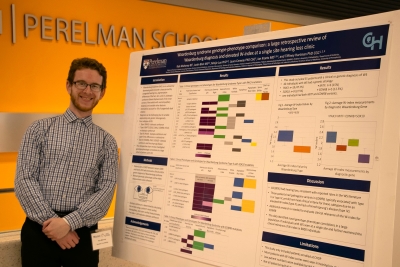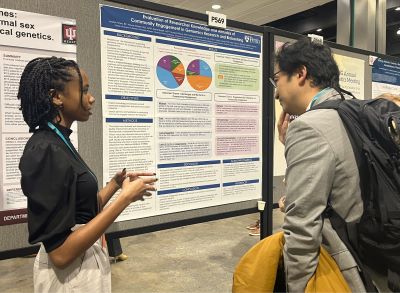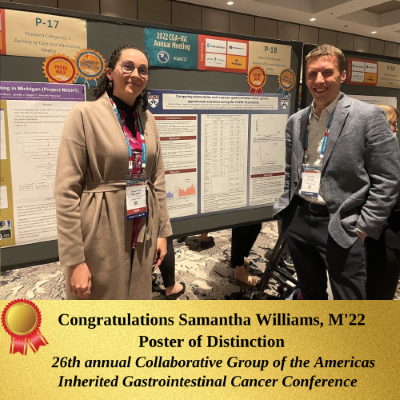Thesis Research as a Genetic Counseling Student

As a requirement of graduation, every student in the program completes an individual research project. Writing a master's thesis is a major accomplishment and a daunting task. That's why the program is structured to guide students through the process. Projects are selected by students based on their interests, and topics are finalized and clarified during the first semester. Students refine their proposals as they complete literature reviews and develop their IRB submissions during a course in research design in the spring semester of the first year.
Throughout the summer and second year, students collect and analyze data, and write their thesis manuscripts, all under the supervision of their primary mentors: one who is a member of the program leadership and one who is an expert in the field of study, typically a genetic counselor or UPenn faculty member.

Research projects range from professional surveys and chart reviews to qualitative studies of small populations of patients with rare diseases, again depending on student interest. Small grants are available through the program to support the research. Students are also encouraged to apply for funds available through NSGC SIGs and other organizations, and many have received research funding.

The majority of students successfully submit abstracts to local and national conferences and for publication toward the end or soon after their second year in the program. A number of 2025 graduates have manuscripts in review, with more in the final stages of submission to a journal, and two already published.
Having gained experience in all aspects of the research process, students graduate from the program with the capacity to develop a research idea, to conduct ethical research, to interact with an IRB, to convert raw data to a written and comprehensible document, and to work collaboratively on a professional project.
So far, our 2025 graduates' thesis work has been presented at the
- American Society of Human Genetics annual meeting
- National Society of Genetic Counselors annual meeting
- Collaborative Group of the Americas Inherited Gastrointestinal Cancer Conference
- Muscular Dystrophy Association Conference
- Clinical Immunology Society Conference
- Li Fraumeni Syndrome Association Meeting
- Pennsylvania Association of Genetic Counselors Annual Meeting
- Basser Center for BRCA Annual Scientific Symposium
- Perelman School of Medicine's Department of Medicine Research Day
- Perelman School of Medicine’s Master’s Student Research Symposium
Recent publications from thesis research:
- Anantharajah A, Chaudhry R, Wittner VA, Cayabyab MAS, Hoffecker G, Wang X, Conway LJ, Medicine Biobank P, Teitelbaum UR, Tuteja S. Consent, Concern, and Capacity: Factors Associated With Attitudes Toward Pharmacogenetic Testing Among Patients With Gastrointestinal Cancer. Clin Transl Sci. 2026 Jan;19(1):e70459. doi: 10.1111/cts.70459. PMID: 41496497; PMCID: PMC12775579.
- Borowka J, Crowley TB, Mani A, Guinta V, McGinn DE, Wang B, Green A, Rockart L, Tran O, Emanuel BS, Zackai EH, Dugoff L, Valverde K, McDonald-McGinn DM. 22q11.2 Deletion Syndrome in Offspring Conceived via Assisted Reproductive Technology Versus Spontaneously. Genes (Basel). 2026 Jan 6;17(1):68. doi: 10.3390/genes17010068. PMID: 41595488; PMCID: PMC12840787.
- Chai, T., Jay Kessler, L., Radway, J., LaMarra, D., & Valverde, K. (2025). Implementing a prebrief for cultural humility in standardized patient sessions with genetic counseling students. Journal of Genetic Counseling, 34(5), e70098.
- Snyder GG, Clay D, Karley S, Pipito S, Mueller R, Bradbury A, Maxwell K, Nathanson KL, Rohanizadegan M, Shah P, Domchek SM, Long JM, Katona BW. Assessment of barriers to pancreatic cancer surveillance in high-risk individuals. J Genet Couns. 2025 Oct;34(5):e70117. doi: 10.1002/jgc4.70117. PMID: 41069182; PMCID: PMC12511838.
- Madden K, Mueller R, Brown C, Valverde KD, Langfelder-Schwind E. Facilitators and Barriers to Increasing Equity in Cystic Fibrosis Newborn Screening Algorithms. Pediatr Pulmonol. 2025 Jan;60(1):e27449. doi: 10.1002/ppul.27449. Epub 2024 Dec 20. PMID: 39704065.
- Wang B, Conway L, Taylor L, Valverde K. The influence of licensure on ABGC certification examination outcomes. J Genet Couns. 2024 Aug;33(4):897-905. doi: 10.1002/jgc4.1802. Epub 2023 Oct 3. PMID: 37787621.
- Kilbride M, Kessler LJ, Cronier B, Park JJ, Cacioppo CN, Beem J, Bradbury, AR. Test-Takers’ perspectives on consumer genetic testing for hereditary cancer risk. Front Genet. 2024 Jul 10;15:1374602. doi: 10.3389/fgene.2024.1374602. PMID: 39050249; PMCID: PMC11266061.
- Gianforcaro K, Pilchman L, Conway L, Moldenhauer JS, Rychik J, Soni S. Is there an increased risk of genetic abnormalities in fetuses with congenital heart disease in the setting of growth restriction? Prenat Diagn. 2024 May 28. doi: 10.1002/pd.6597.
- Ward A, Farengo-Clark D, McKenna DB, Safonov A, Good M, Le A, Kessler L, Shah PD, Bradbury AR, Domchek SM, Nathanson KL, Powers J, Maxwell KN. Clinical management of TP53 mosaic variants found on germline genetic testing. Cancer Genet. 2024 Apr 23;284-285:43-47. doi: 10.1016/j.cancergen.2024.04.002. Epub ahead of print. PMID: 38677009.
- Gaiser KB, Schindewolf EM, Conway LJ, Coleman BG, Oliver ER, Rychik JR, Debari SE, Mcdonald-Mcginn DM, Zackai EH, Moldenhauer JS, Gebb JS. Enlarged cavum septum pellucidum and small thymus as markers for 22q11.2 deletion syndrome. Prenat Diagn. 2024 Mar 18. doi: 10.1002/pd.6555.
- Crane HM, Asher S, Conway L, Drivas TG, Kallish S. Unraveling a history of overlap: A phenotypic comparison of RBCK1-related disease and glycogen storage disease type IV. Am J Med Genet A. 2024 Mar 4:e63574. doi: 10.1002/ajmg.a.63574.
- Kessler LJ, Mundt M, Freiberg Y, Taylor L, Valverde KD. Telesupervision in genetic counseling education during COVID-19 and beyond. J Genet Couns. 2024 Dec;33(6):1252-1261. doi: 10.1002/jgc4.1845. Epub 2024 Jan 7. PMID: 38185868.
- Anez Bruzual I, Coughlin S, Clay D, Heiman J, Dungan M, Weber M, Almario CV, Leung G, Ahmad, NZ, Ginsberg G, Kochman M, Valverde KD, Long J, Katona BW. Assessment of the Psychosocial Impact of Pancreatic Cancer Surveillance in High-Risk Individuals. Cancers 16(1):86. DOI:10.3390/cancers16010086. Dec 2023.
- Sullivan KR, Ruggiero SM, Xian J, Thalwitzer KM, Ali R, Stewart S, Cosico M, Steinberg J, Goss J, Pfalzer AC, Horning KJ, Weitzel N, Corey S, Conway L, Son Rigby C, Bichell TJ, Helbig I. A disease concept model for STXBP1-related disorders. (2023). Epilepsia Open. https://doi.org/10.1002/epi4.12688.
- Williams S, Ebrahimzadeh JE, Clay D, Constantino G, Heiman J, Wangensteen KJ, Valverde K, Mahmud N, Katona, B.W. Comparing telemedicine and in-person gastrointestinal cancer genetic appointment outcomes during the COVID-19 pandemic. Hered Cancer Clin Pract. 2023 May 8;21(1):6. PMID: 37158974; PMCID: PMC10165576. https://pubmed.ncbi.nlm.nih.gov/37158974/.
- Cohen SR, Helbig I., Kaufman MC, Myers LS, Conway L, Helbig KL. Caregiver assessment of quality of life in individuals with genetic developmental and epileptic encephalopathies. Dev Med Child Neurol. 2022 Aug;64(8):957-964. http://doi: 10.1111/dmcn.15187. Epub 2022 Feb 28. PMID: 35229292; PMCID: PMC10305579. https://pubmed.ncbi.nlm.nih.gov/35229292/.
-
Lee G, Varughese LA, Conway L, Stojinski C, Ashokkumar S, Monono K, Matthai W, Kolansky DM, Giri J, Tuteja S. Attitudes toward pharmacogenetics in patients undergoing CYP2C19 testing following percutaneous coronary intervention. Per Med. 2022 Mar;19(2):93-101. doi: 10.2217/pme-2021-0064.
-
Wadman E, Conway L Garbarini J, Baker M. Moral distress in genetic counseling: A study of North American genetic counselors. J Genet Couns, 2022; 00: 1-11. https://doi.org/10.1002/jgc4.1551
-
DeJesse J, Vajravelu RK, Dudzik C, Constantino G, Long JM, Wangensteen KJ, Valverde KD, Katona BW. Uptake and outcomes of small intestinal and urinary tract cancer surveillance in Lynch syndrome. World J Clin Oncol 2021; 12(11): 1023-1036. doi:10.5306/wjco.v12.i11.1023
-
Crawford K, Xian J, Helbig, KL, et al. (2021). Computational analysis of 10,860 phenotypic annotations in individuals with SCN2A-related disorders. Genetics in Medicine: Official Journal of the American College of Medical Genetics, 23(7), 1263–1272. doi.org/10.1038/s41436-021-01120-1
-
Hartman TR, Demidova EV, Lesh RW, Hoang L, Richardson M, Forman A, Kessler L, Speare V, Golemis EA, Hall MJ, Daly MB, & Arora S. (2020). Prevalence of pathogenic variants in DNA damage response and repair genes in patients undergoing cancer risk assessment and reporting a personal history of early-onset renal cancer. Scientific Reports, 10(13518). doi.org/10.1038/s41598-020-70449-5
-
Price E, Robbins SJ, Valverde KV. Increasing diversity in the genetic counseling profession: Development of recruitment tools for African American undergraduate students. J Genet Couns, 2020 Apr;29(2):224-233. doi: 10.1002/jgc4.1280
-
Grand K, Katz L, Crowley B, Moss E, Lessig M, Bamba V, Zackai E, Emanuel B, Valverde K, and McDonald-McGinn D. (2018). Impact of Hypocalcemia on Full Scale IQ in Patients with 22q11.2 Deletion Syndrome. American Journal of Medical Genetics: Part A. 2018 Oct; 176 (10): 2167-71. doi: 10.1002/ajmg.a.40535.
- McCarty A, Miller J, Pennington J, Fecteau H, Kessler L. (2018). Utilization of the Tablet Application Proband in Pedigree Construction and Assessment. J Genet Couns. 2018 Apr;27(2):406-415. doi: 10.1007/s10897-017-0197-1.

